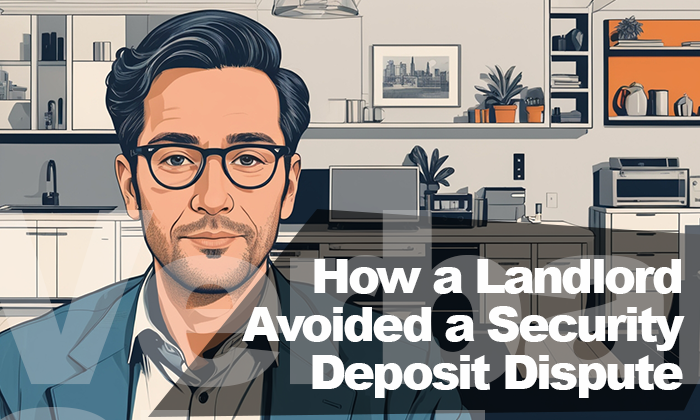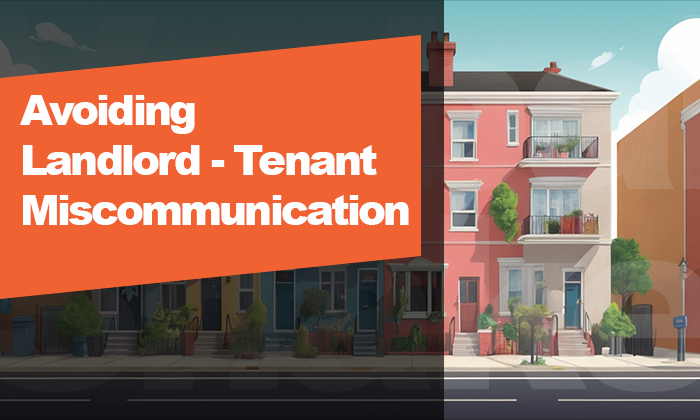Case Study: How a Landlord Avoided a Security Deposit Dispute

Security deposits are meant to protect landlords from damages beyond normal wear and tear. They’re supposed to be straightforward. But too often, move-out day turns into a debate about what’s considered “normal wear and tear” and what requires deductions.
Without clear documentation, these disputes can quickly escalate into arguments, bad feelings, or even legal battles.
But it doesn’t have to be this way. In fact, a simple written acknowledgment can prevent long, drawn-out disputes and keep the landlord-tenant relationship amicable—even at the end of the lease.
Here’s how one landlord, James, avoided a potential security deposit dispute with a few simple steps.
The Situation: Move-Out Day and Carpet Stains
James is a landlord who rents out a condo in a bustling urban neighborhood. He prides himself on maintaining a good relationship with his tenants by being fair, communicative, and reasonable.
When his tenant, Lisa, gave her move-out notice, James scheduled a walkthrough to assess the condition of the property. This was standard procedure, outlined in his lease agreement, to identify any damages beyond normal wear and tear.
During the walkthrough, everything seemed fine—except for one problem: carpet stains in the living room.
The stains were noticeable, darkened by what looked like spilled drinks that had been left to set in. They clearly went beyond normal wear and tear.
James pointed them out, and to his relief, Lisa didn’t argue. She admitted that the stains were from a party she had thrown a few months earlier. “I tried cleaning them myself, but they wouldn’t come out,” she explained.
Then she asked, “If I have the carpets professionally deep cleaned before I move out, can I get my full deposit back?”
James appreciated her willingness to resolve the issue and agreed to her proposal. But he knew from past experience that a verbal agreement wasn’t enough. He needed to document it.
The Agreement: Documenting It on the Spot
James had learned the hard way that verbal agreements often lead to misunderstandings. In the past, he had been lenient with another tenant, only to face a heated argument when deductions were made from the security deposit.
Determined not to make the same mistake twice, he documented the conversation immediately.
He sent Lisa a text message summarizing their agreement:
- “Tenant acknowledges the carpet stains go beyond normal wear and tear. If the stains are removed with professional deep cleaning, no deductions will be made. Otherwise, cleaning costs will be deducted from the deposit.”
James made sure to be specific:
- Who is responsible: Lisa, the tenant.
- What needs to be done: Professional deep cleaning to remove the stains.
- Outcome: No deductions if cleaned; cleaning costs deducted if not.
This left no room for interpretation. The terms were clear and specific, eliminating any potential “I thought you meant…” arguments.
Lisa replied, “Understood, I’ll schedule a deep cleaning.”
With this written acknowledgment, James felt confident that the situation was handled professionally and fairly.
Move-Out Day: The Problem Returns
Move-out day arrived, and James returned to the condo for the final inspection. To his surprise, the carpet stains were still there—unchanged and just as visible as before.
He asked Lisa about it, and she admitted, “I got busy with the move and didn’t get around to scheduling the cleaning. But they’re just stains... Can’t I still get my full deposit back?”
James stood his ground, reminding her of their agreement. He pulled out his phone and showed her the text message exchange.
- It was clear and time-stamped.
- It showed her acknowledgment of the stains and the conditions for avoiding deductions.
- There was no ambiguity or room for debate.
Lisa read the messages again, sighed, and agreed. “You’re right. I did say I’d get it cleaned. It’s fair to deduct the cleaning costs.”
No argument. No frustration. No dispute.
James deducted the professional cleaning fee from her security deposit and refunded the remainder. Both walked away feeling the situation was handled fairly.
Why This Worked: The Power of Clear Documentation
This situation could have easily turned into a dispute. Without written documentation, it would have been Lisa’s word against James’s—leading to frustration, anger, and potential damage to James’s reputation as a landlord.
Instead, a simple written acknowledgment prevented a misunderstanding from becoming a conflict.
Why This Worked:
- Specific Language: The agreement clearly stated the conditions for refunding the deposit. It wasn’t vague or open to interpretation.
- Timely Documentation: James documented the conversation immediately after the walkthrough, preventing memory gaps or misinterpretations later.
- Mutual Confirmation: Lisa confirmed the agreement in writing, showing her understanding and acceptance of the terms.
This approach kept things fair, transparent, and professional.
What Can We Learn from James’s Story?
James’s story isn’t just about a security deposit. It’s about the importance of clear communication and written documentation in rental agreements.
As a landlord, you’re likely to encounter various situations that require quick agreements, like:
- Late rent payments or payment plans.
- Permission to make minor alterations or repairs.
- Exceptions to lease rules, like having guests or pets.
These informal agreements feel easy in the moment but often lead to disputes later. The problem isn’t bad intentions—it’s poor communication.
The Solution? Document Everything.
But this doesn’t mean you need a formal contract for every small agreement. In fact, a quick text message or email is often enough, as long as it:
- Clearly states the terms.
- Specifies who is responsible for what.
- Outlines the consequences for not fulfilling the agreement.
This keeps both parties accountable and eliminates ambiguity.
Why Verbal Shake Is the Perfect Tool for This
We built Verbal Shake because we were tired of handshake deals turning into “I thought we agreed on…” arguments.
Verbal Shake bridges the gap between informal verbal agreements and rigid legal contracts. It allows you to:
- Document agreements in real-time. No need to draft formal contracts for every small conversation.
- Get instant confirmation. The other party confirms the agreement with a quick click.
- Save everything securely. All agreements are stored securely, ensuring you have proof if questions arise later.
If James had been using Verbal Shake, he could have documented the agreement even faster, with an official record to back him up.
Avoid Security Deposit Disputes by using Clear Agreements
Security deposit disputes are one of the most common conflicts landlords face. But they don’t have to be. With clear communication and quick documentation, you can protect yourself from misunderstandings and keep tenant relationships positive.
James’s story is proof that a few seconds of effort today can save you hours of frustration tomorrow.
Want to avoid security deposit disputes?
Verbal Shake is launching soon. Be among the first to try it and see how easy it is to turn conversations into clear, enforceable commitments.
Ready to Protect Your Agreements?
Visit Verbal Shake to learn more, or sign up for updates on our launch. Keep your agreements clear, fair, and dispute-free with Verbal Shake.



